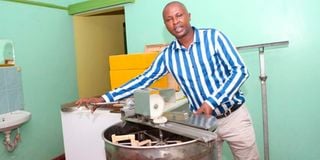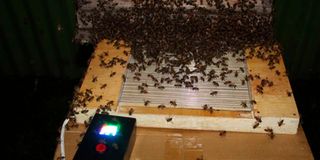Premium
Paul Mutua harvests venom, pollen and jelly from bees

Paul Mutua, the director and founder of Savannah Honey, showing a centrifugal machine that is fitted with honey combs. The machine is used to extract honey from the combs.
What you need to know:
- Bees are key in the growth, and development of natural habitats.
- For most of the food we consume, bees play a part in their making through pollination.
- Kenya has had a deficit in honey production which leads to over 80 per cent of honey processed locally imported.
Utawala, located some 22km from the Nairobi central business district, is a thriving residential and commercial suburb if the huge population it hosts is anything to go by.
Deeper into the cosmopolitan area, the Seeds of Gold team meets Paul Kyallo Mutua, the director and founder of Savannah Honey at his premises.
He is in the company of his two staff extracting honey from combs using a centrifuge.
“Apart from installation and delivery of Langstroth hives, we produce, harvest and process honey,” says Mutua, adding that other products include bee pollen, propolis, royal jelly, wax and bee venom.
Out of the products, he says royal jelly, which is a milky substance in the hive, is the most complex to extract as it requires advanced technical machines and patience.
Mutua studied urban and regional planning at Maseno University and graduated in 2005. He, thereafter, worked in the civil service until 2012 when he choose to pursue his interest in beekeeping.

A bee venom harvester at work.
“While working, I was also keeping bees in four hives at my rural home in Makueni, which supplied me with honey for domestic consumption. One day while at work a Japanese friend showed me how farmers in his country were making dozens of bee products and this opened my eyes.”
A little research informed him that most bee farmers across the country were using traditional methods of keeping the insects and only harvested honey.
“To move from domestic to commercial production, I invested Sh50,000 from my savings to buy eight Langstroth bee and rented a shop to operate from.”
He further bought a locally assembled centrifuge machine at Sh70,000.
“I had done research and established that the centrifuge machine best extracts honey from the combs, after the frames have been removed from the hives while they still contain some heat,” he explains, adding to set up the business he required a single business permit and public health certificate from the county government.
He also went for beekeeping and value addition training at the National Beekeeping Centre in Nairobi and later obtained a Kenya Bureau of Standards certificate after his products were approved for food safety standards.
“I work with some 700 farmers in Kakamega, Bungoma, Migori, Kitale, Kitui and Makueni who supply me honey at between Sh400 and Sh450 a kilo. I ask the farmers to use an extractor so that the honey collected is hygienically clean and of high standard,” he says, adding he buys at least 400 kilos every week.
Some of the farmers also supply him bee venom, propolis, wax or royal jelly, which need technical skills to harvest. He also harvests the products from his hives, eight in Utawala and 70 in Kitale.
Apart from selling pure honey at Sh500 a kilo, he makes the other bee-related products.

Paul Mutua at his firm in Utawala, Nairobi.
Mutua uses a pollen collector to collect bee pollen – the yellow substance on the legs of the bees when they go to pick nectar from the flowers.
The collector, which has tiny holes, is screwed at the entrance of the hive. And as the bees struggle to enter, the pollen falls on the trays, and is then collected, dried and packaged.
"We harvest three times a week between 100-200 grams of pollen and sell a kilo at Sh6,800," he says, noting that the pollen has a special protein that is not found in meat.
The product, he says, is good for the elderly, lactating mothers and people living with HIV and cancer.
Another bee product harvested is the propolis, a substance that the bee uses to seal cracks in the hives. Most farmers throw it away thinking that it is a waste.
“To get propolis, one should first open the beehive lid, then get a small plywood and put it inthe hive and wait for 14 days. When the temperature increases, the lid is removed and the propolis collector inserted,” he explains.
According to him, propolis, which is medicinal, is arranged vertically on top of the plywood. He harvests about a kilo after every 14 days and sells each at Sh1,900.
Similarly, a bee venom harvester is normally placed on top of the hive and then switched to send slight waves into the hive.
"The hypersensitive nature of the bees makes them irritated so that they bite the machine and drop the venom, between 0.75-1.2 grams after about 45 minutes. A gram of venom goes for Sh4,000," he says, adding that he has has directly employed 10 youths who assist in marketing, production, distribution and making hives for sale.
The venom can be blended with honey to make bee venom honey and that is an ideal treatment for those suffering from arthritis. A kilo of bee venom honey goes for Sh4,800.
For jelly, they harvest two to three times a year where a single beehive gives him 200-300 grams a year.
Mutua has workshops in Utawala and Kitale where he makes the hives and sells each at Sh5,500.
His company has invested heavily in marketing that buyers not only come from Malindi, Nairobi, Kisumu and Nakuru in Kenya but also Burundi, Rwanda, Uganda and Tanzania.
“There are many opportunities in the honey business, one also needs to identify what they can do and then maximise,” says Mutua, the director and founder of his business, who in fives years hopes to have physical branches of the firm outside Kenya.
Samwel Kamau, an entomologist from Kabete Veterinary Laboratory, says there is untapped potential in beekeeping because most farmers are into honey, the only visible product. Export of waxwas first done in 2010, which means most bee products are recent.
"In order to extract products such as the royal jelly, one must be keen as the queen always feeds on it thus if you pick all, it is deprived of its food.”
He notes extraction of products like bee venom, propolis, wax and the royal jelly need technical knowhow and investment in machinery.
Kamau urges beekeepers to follow good practices like putting the hive in good environment where the insects will get nectar and water and they would not be a threat to people.





